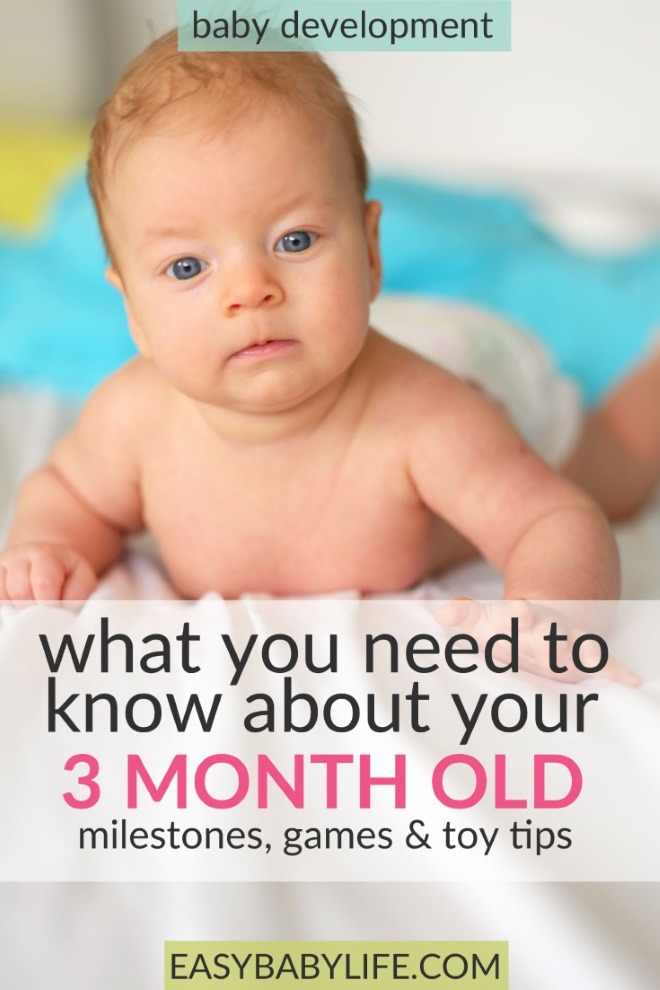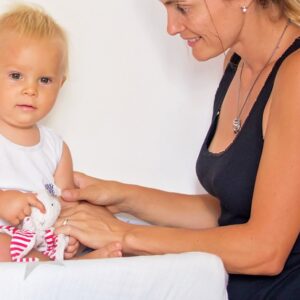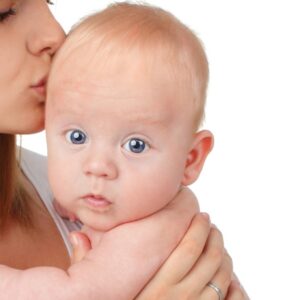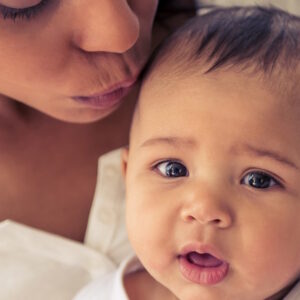Are you curious about 3-month-old baby development? Lots of amazing things are happening! Learn all about it here, and find learning activities and toy tips for your 3-month-old baby too.
|
Are you exhausted? The “worst part” is soon over now. With a 3-month-old baby, many new parents notice that life with the new baby slowly becomes easier.
Why?
Well, colic and stomach pain usually decline. The baby is more communicative and easier to understand and help.
Some babies start sleeping better and eat less often.
Now, what can you expect from a 3-month-old baby?
Your baby is now officially considered an infant and not a newborn, and he is ready to show you his personality.
A wonderful thing is that he or she will likely be very fond of you and really show it.
Want to know more about your new little family member? Read on!
3-Month-Old Baby Development and Activities
- 3-Month-Old Baby Development Milestones
- 3-Month-Old Baby Sleep Pattern
- 3-Month-Old Developmental Red Flags
- Learning Activities for the 3-Month-Old
- Best Toys for Your 3-Month-Old Baby
- 3 Month Old Baby Video
3-Month-Old Baby Development Milestones
Here’s what to expect from a 3-month-old baby:
Physical Development
Weight and Length
Your baby is growing fast.
The average weight for a 3-month-old baby boy is 14 pounds (6.4 kg), and for a 3-month-old baby girl, 12 pounds and 14 ounces (5.8 kg).
When it comes to length/height, the average length for a 3-month-old baby boy is 24.25 inches (61.4 cm), and for a 3-month-old baby girl, 23.5 inches (59.8 cm).
Remember that these are average measures and that every baby grows and gains weight at a different pace. The most important thing is that your baby is growing and gaining weight at a healthy rate.
Vision and Hearing
As the vision is further developing, a 3-month-old baby can now clearly see and recognize objects at a distance of 8 to 15 inches.
Many babies now love to look at faces. An unbreakable mirror can be a great toy to place in the crib or in front of the baby during tummy time.
Your baby also enjoys brightly colored objects and toys, so make sure he has some he can look at and try to grab.
You might have noticed that your newborn’s eyes would cross when he tried to focus on an object close to his face. By the time he is 3 months old, your baby will be able to focus his eyes on an object without them crossing.
With stronger muscles and better hearing, your baby will likely turn his head toward your voice.
Motor skills
Your baby’s motor skills, coordination, and strength are developing rapidly.
Your baby becomes stronger and more steady and might discover how fun it is to stand up and straighten the legs. My daughter did this early and everywhere. It even became a hassle to change her diapers because she refused to bend her legs.
As their neck and upper body muscles strengthen, most babies can now better support themselves. They can hold their head up longer and lift the chest and support themselves on their arms (not hands) for a while if placed on their tummy. You’ll find tummy time tips here.
Hand-eye coordination is improving, and soon enough, your baby will start reaching for things and grabbing anything within reach. Something to remember if you have your baby on your lap while having dinner!
Your baby will probably put her hand in her mouth and might also begin to suck her thumb and find comfort in it.
Your 3-month-old has gained more control in her arms and can reach for objects and try to bat at them when they are dangling. Also, she can now probably grab and hold an object for a little while.
At 3 months of age, a baby will move around more and possibly be able to roll over from side to back. She will also kick her legs with more strength. For this reason, leaving the baby alone on the bed, sofa, or a changing table, even for a minute, is very dangerous!
Cognitive and Social Development
Personality emerges
Your baby’s personality is now slowly starting to shine through.
With every passing week, your 3-month-old baby will become more open to other people.
He might start playing with you and others. You might notice your baby making different facial expressions and also trying to mimic yours.
On the other hand, he has realized who his closest family is. Mom, dad, and siblings are his favorites.
Smiling
Your 3-month-old baby is finally showing his social smile when interacting with people. Smile at your baby, and you might notice your baby smiling back.
Your baby might even start to laugh out loud. What a beautiful sound to hear!
Crying
At 3 months of age, a fantastic milestone is that the crying subsides and other ways of communicating increase.
New ways of communicating
Your baby has found new ways to communicate with you. She starts cooing and making sounds such as “oh.” She might also try to imitate sounds that she hears when you talk.
Talk to your baby as much as you can. You can expect her to respond so you can have a conversation. Your baby is now slowly starting to understand that a conversation is a two-way process.
An interesting thing to notice is that, without thinking, you probably use a very light and soft voice when talking to your baby. That is nature’s way of ensuring that the baby knows he is being talked to and that no one will scare him by talking aloud.
The 3-Month-Old Baby Sleep Pattern
A 3-month-old baby might start sleeping through the night (6-8 hours) or at least sleep for longer stretches.
If your baby is still waking up often to eat or merely waking up during the night, don’t worry; this is completely normal. Many babies will continue to wake up frequently and might need some time to start sleeping through the night.
3-Month-Old Developmental Red Flags
Remember that every baby develops on their own timeline. Don’t worry if your 3-month-old didn’t reach all the milestones mentioned above. However, there are some warning signs you should keep an eye on.
Talk to your pediatrician if you notice that your baby:
- Can’t focus her eyes or if her eyes are still regularly crossing
- Doesn’t follow objects or people with her eyes
- Doesn’t respond to sounds
- Doesn’t smile
- Doesn’t grasp objects
- Can’t hold the head up or push chest up while lying on the tummy
3-Month-Old Baby Development Activities
Talk to your baby!
Research indicates that if parents talk to their children, babies develop a higher IQ. If it is hard for you to think of something to talk about, narrate to your baby what you’re doing, point to things you walk by, or tell him your inner thoughts. Right now, your baby is not picky!
The strongest connection between IQ and conversation is found for toddlers between 18 and 24 months, but there is evidence for babies as young as 3 months, so talk to your baby as much as possible! (Research reference here.)
Let your baby look at new objects often. Colorful new shapes are very exciting. Research indicates that looking at new things and objects could also generate a higher IQ.
Many babies love “flying“! Lie down on your bed and lift your baby into the air. If you start every “flying session” with a slow “One two three” or something similar, your baby will soon realize what to expect and start smiling long before he is actually “flying”. Make him crash slowly towards your face for a kiss!
This is also an excellent game for strengthening the baby’s back muscles. For more ideas to help your baby endure tummy time, click here.
Best Toys for Your 3-Month-Old
At three months of age, a baby gym is likely to be your little one’s favorite. A fun time for your baby, some spare time for you! Baby Einstein has a gym with a built-in mirror and playmat. Great for this age! Check it out at Amazon here.
Since your baby might spend more extended periods on her tummy now, it is a good idea to invest in some sort of a baby play mat – if it didn’t already come as a part of the baby gym.
A baby-safe unbreakable mirror can be fun for the 3-month-old AND a great way to spend tummy time, which is otherwise something small babies often hate.
All sorts of rattles for babies are fun too!
3-Month-Old Baby Video
In this video, you can see a mom playing with her 3-month-old. More play tips!
Where would you like to go next?
|
You’ll find all articles and Q&As on 3-month-old babies here!
And please share something about your little 3-month-old by leaving a comment below! :-)

Paula Dennholt founded Easy Baby Life in 2006 and has been a passionate parenting and pregnancy writer since then. Her parenting approach and writing are based on studies in cognitive-behavioral models and therapy for children and her experience as a mother and stepmother. Life as a parent has convinced her of how crucial it is to put relationships before rules. She strongly believes in positive parenting and a science-based approach.
Paula cooperates with a team of pediatricians who assist in reviewing and writing articles.







